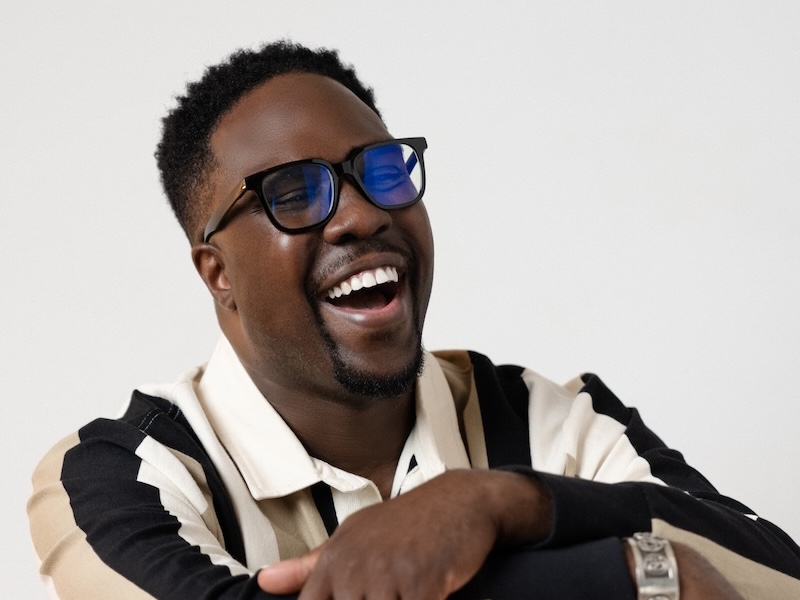
Thu December 4, 2025
One of contemporary music's most complete and complex artistsDERRICK HODGE WITH COLOR OF NOIZE STRINGS
Doors: 7:00 PM Show: 7:30 PM
Derrick Hodge is one of contemporary music's most complete and complex artists. Driven by a passion for music rather than genre, he is defined only by his multiplicity. Lauded as a composer and revered as one of the great bassists and musicians of his generation, Hodge's solo projects-Live Today (2013), The Second (2016), and Color of Noize (2020)-have been met with acclaim from critics and audiences alike. His albums are rich, raw and revelatory, reflecting his breadth of musicality and influence; from roots in the church, to an undercurrent of hip-hop, neo soul and eternal reverence for melody and classical composition. Like the artist, Hodge's music is defined only by its multiplicity .
Growing up just outside Philadelphia, Hodge's talent was quickly recognized by the luminaries of the city's neo-soul movement. As a college student, he became the bass player and musical director of choice for music pioneers like Jill Scott, Maxwell, Floetry, Nas, Common, James Poyser and Musiq Soulchild. At the same time, he was forging a career in jazz circles with legendary musicians including Terence Blanchard, Donald Byrd, Mulgrew Miller and Bootsie Barnes, while also performing in his university's orchestra.
Hodge has played a foundational role in a wealth of groundbreaking projects and historic firsts. In 2022, he directed the music for the Academy Awards and arranged for Nas's performance at the Grammys. As part of CNN'S Juneteenth celebration, conducted the first all Black orchestra to perform at the Hollywood Bowl. In 2014 he became the first Black composer to compose Hip Hop for the National Symphony when he acted as orchestral arranger and music director for the 20th anniversary celebration of Illmatic. The event, conducted by Steven Reineke at the Kennedy Center and named one of the top moments in hip hop history by Fender Magazine, was also the first time hip hop was ever performed by the National Symphony Orchestra. He was also the first Black composer to write strings for hip hop at Carnegie Hall and to write symphonic music for hip hop with the Houston Symphony.
This habit of breaking new ground and forging new paths speaks to how significant a cultural force Hodge is both on and beyond the stage. In 2017 he was commissioned by the Smithsonian's National Museum of African American History and Culture to write an installation of music that accompanies their permanent exhibition exploring geography, memory, and imagination, The Power of Place. Hodge also composed for Social Dance, part of NMAAHC's Cultural Expressions exhibition exploring African American and African diaspora culture, and its Making a Way Out of No Way, which pays tribute to the creativity, agency and resilience of Black people in the U.S.
Throughout his life, Hodge has devoted himself to projects that elevate and animate the African American legacy: the struggle but also-and always-the poetry and the triumph too. This ability to honor and advance both culture and people is the principle thread which weaves together Hodge's work.
Hodge's devotion to illuminating and celebrating Black culture and art is apparent in his impressive portfolio of film composition. He has scored and composed for a plethora of small and big screen works, including The Black Candle, a groundbreaking documentary about Kwanzaa narrated by Maya Angelou, and Faubourg Treme: The Untold Story of Black New Orleans, and has been music consultant and musician on many more, including the 2020 blockbuster The Photograph starring Issa Rae and LaKeith Stanfield. While Hodge often lends his talents to the specific set of cinema and storytelling which chronicles Blackness in the U.S., he is also awake to the universal nuances of the human experience. This is why, perhaps, he has found such universal acclaim and appreciation: his music tells stories that are simultaneously of a people, and of the people. He bridges gaps between worlds as well as genres, making him an exceptional musical foil for the big screen as well as a potent and important voice for our era.
As a performer, Hodge has founded and played in bands and groups as diverse and as influential as R+R=Now, the Robert Glasper Experiment, and The Blue Note All Stars. As a producer he has collaborated with icons including Quincy Jones, Don Was, and Common. As a musical director he has worked with luminaries including Yasiin Bey and, from 2009 to 2019, Maxwell.
The Color of Noize project is Hodge's signature concept-series, bringing together contrasting sounds, styles and set-ups to create an immersive audio-visual experience. It is also particularly close to Hodge's heart as it opens up not just his music, but also his mission: to create a new, free space for music and to champion both established and emerging musicians. More than an album, the Color of Noize is an ongoing commitment to artistic excellence and inclusion, in particular the creation of opportunities and broadening of horizons for inner city youth. He first premiered Color of Noize in 2019 as part of his artist residency at Monterey Jazz Festival, where Hodge brought together a collection of musicians, some as young as four, on stage with him to explore his original compositions in a remarkably moving and beautiful concert. As he puts it "it was never just my potential that made things happen; it was also my community advocating for me-now I want to advocate for others, to pass that on". Hodge remains true to that statement, advocating and creating spaces for classically trained black orchestra members through The Color of Noize Orchestra and The Black Radio Orchestra. The Black Radio Orchestra has graced the stage of the Kennedy Center bringing the intersection of Jazz and Hip Hop to the forefront under Hodge's leadership. The Color of Noize Orchestra made its debut this summer at the iconic Hollywood Bowl, performing alongside artists like T-Pain and Anderson .Paak. In October, Derrick Hodge and the Color of Noize orchestra joined forces with WILLOW at The Ford Theater, and in November, they shared the stage with Angelique Kidjo at Carnegie Hall.
This is the natural progression for an artist whose career has always been as rooted in meaning as it is in music: Hodge's body of work speaks to a sense of social responsibility that he carries as carefully as his creativity. Whether collaborating with giants, writing for the big screen, forging new paths for orchestral composition, or creating outreach projects like providing access to his symphonic scores and original arrangements to HBCUs and inner city music programs, his work has the telltale trademark of always provoking social commentary, awareness, or insight. Here we find the fundamental character of Hodge; an incurably hopeful man, who, through his work and his art, has made the world a definitively more beautiful place.
